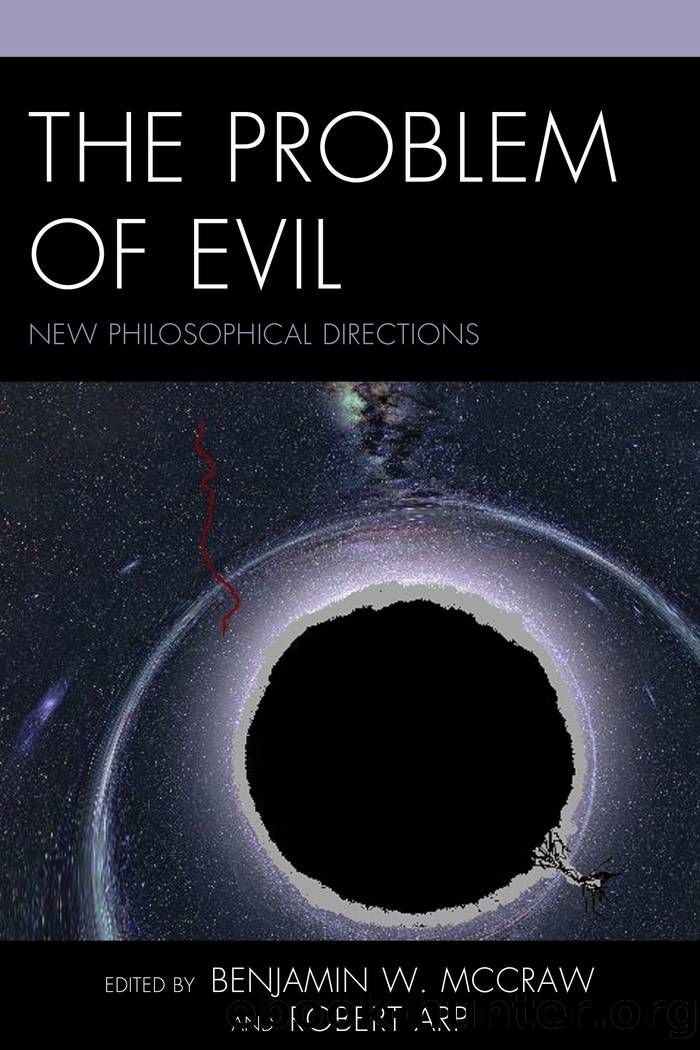The Problem of Evil by McCraw Benjamin Arp Robert

Author:McCraw, Benjamin,Arp, Robert
Language: eng
Format: epub
Tags: undefined
Publisher: Lexington Books, a division of Rowman & Littlefield Publishers, Inc.
Published: 2012-09-15T00:00:00+00:00
Tooley’s New Evidential Argument from Evil
In his concrete formula of the EAE, then, Tooley chooses to dwell on the Lisbon earthquake of 1755 in which some 60,000 people—men, women, and children—died. I will attempt to summarize elements of Tooley’s long argument (consisting of 20 premises and a conclusion), lay out an important principle of the symmetry of unknown values Tooley employs, and examine some of the justification that is offered for these moves.
Tooley gives his evidential argument in two stages—not unlike William Rowe’s famous article—one having a deductive part, and another an inductive, probabilistic part. The first deductive stage is set up as a conditional proof, pivoting on some 3–4 putative necessary truths about God and God’s interventions in the world. The first general principle Tooley states, like Rowe’s second premise in his famous EAE, says that if there is any action A the decision not to eliminate some condition C of which is counted as morally repugnant, then, ultima facie, God would never perform A. (Of course, given what I said above in the last section of criticism of Tooley’s set up for his EAE, one wonders at which time in the persons’ lives affected by some suffering they make these judgments about the value of such experiences to their lives. Timing is everything!—or may be quite crucially important here.)
Now, Tooley plugs in the Lisbon earthquake, in which some 60,000 people lost their lives, for C, stating that God should have eliminated C if in fact not doing so would cause God to be morally repugnant, ultima facie. But if, per history, the earthquake happened, then this implies (by Tooley’s lights) that God, an omnipotent, omniscient, moral perfect being did not exist at the beginning of the Lisbon earthquake, and of course, then, at no other point as well. The logically necessary principles Tooley uses are intended to tie together God with a being who is omnipotent, omniscient and morally perfect, and with God having to intervene to eliminate significant moral evils and whose non-elimination would impugn God’s moral perfection.
In part two of his argument, Tooley gives us the probabilistic phase of his new evidential argument from evil. He introduces the concept of wrongmaking properties, the property brought about by (say) not eliminating a condition (or state of affairs) that brings upon widespread death, saying that it would give an agent the wrongmaking property of not eliminating known evils the occurrence of which would bring about the death of some 60,000 regular human beings. The fact that the earthquake took place indicates clearly that God did not elect to eliminate this evil. So, Tooley concludes that we do know this much: that there is in fact a known wrongmaking property, other things being equal, to the allowance of some state or condition that results in the death of about 60,000 regular human beings. The remaining probabilistic part of his argument, which employs Carnapian objective inductive logical theory, then tries to ferret out what the probabilities are that are known
Download
This site does not store any files on its server. We only index and link to content provided by other sites. Please contact the content providers to delete copyright contents if any and email us, we'll remove relevant links or contents immediately.
| Anthropology | Archaeology |
| Philosophy | Politics & Government |
| Social Sciences | Sociology |
| Women's Studies |
The Secret History by Donna Tartt(18053)
The Social Justice Warrior Handbook by Lisa De Pasquale(11930)
Thirteen Reasons Why by Jay Asher(8397)
This Is How You Lose Her by Junot Diaz(6401)
Weapons of Math Destruction by Cathy O'Neil(5779)
Zero to One by Peter Thiel(5443)
Beartown by Fredrik Backman(5293)
The Myth of the Strong Leader by Archie Brown(5204)
The Fire Next Time by James Baldwin(4985)
How Democracies Die by Steven Levitsky & Daniel Ziblatt(4931)
Promise Me, Dad by Joe Biden(4890)
Stone's Rules by Roger Stone(4818)
100 Deadly Skills by Clint Emerson(4647)
Rise and Kill First by Ronen Bergman(4525)
A Higher Loyalty: Truth, Lies, and Leadership by James Comey(4520)
The David Icke Guide to the Global Conspiracy (and how to end it) by David Icke(4348)
Secrecy World by Jake Bernstein(4342)
The Farm by Tom Rob Smith(4294)
The Doomsday Machine by Daniel Ellsberg(4220)
